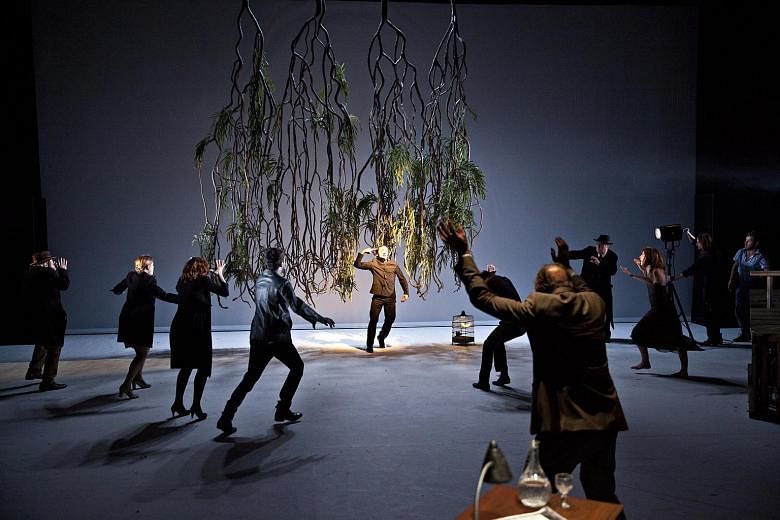SIX CHARACTERS IN SEARCH OF AN AUTHOR by Theatre de la Ville
Singapore International Festival of Arts
Victoria Theatre/Thursday
A frustrated Director and a group of Actors are rehearsing another absurd Pirandello play when six Characters, shrouded in black, materialise on stage. As the title suggests, they are in search of an author to finish their story and they have decided that this gang would be the ones to do it.
While the idea of meta-theatre - where characters in a play are aware of their own theatricality - stretches back as far as Shakespeare (Hamlet's play within a play, for instance), Italian playwright Luigi Pirandello took things to a new level with this aggressively self-reflexive play.
In this contemporary take, French director Emmanual Demarcy-Mota stays relatively faithful to Pirandello's 1921 text in his attempt to recreate a modern classic from a roundabout academic treatise.
The stagecraft is spare but absorbing - an knot of trees descends from above at one point, and there is plenty of clever shadow play as characters loom and shrink behind a billowing white cloth. Entire sets-within-a-set disappear and reappear.
But all these lovely trappings of set and lighting design can't quite paper over my suspicions that this work is fundamentally less of a play than an intellectual exercise, although the director or performers do their best to lure the audience into their world.
The Characters, led by the Father, are wrapped up in a soapy melodrama mostly involving him unwittingly copulating with his Step-Daughter in a brothel. This is much to the perpetual horror of the Mother, who has three other children, including the Father's only legitimate Son. The Director, and eventually the Actors, are intrigued by their convoluted tale, but are shocked to realise there is no script.
"The tragedy is in us," booms the Father, "we are the tragedy!"
Therein lies the play's central conflict: can an actor ever truly portray the tragedies of the living on stage? Will the Actors' performance always be a facsimile of the real thing, doomed to be a moment's entertainment to an audience while the Characters relive each painful moment in excruciating detail?
This production suggests that there is ultimately very little difference between the "fiction" of the Characters and the "reality" of the Actors. Both sides are made to perform their roles in a very formalised, deliberately dramatic manner, so that we are always aware that the show they are creating for us is an illusion.
The Characters are archetypes, shoehorned into a very narrow scope of existence - they are only aware of their own traumas, paying no attention, even dismissing, the emotional worlds of others.
But the Director and Actors themselves are also stereotypes: he's a pretentious ringmaster waving his arms, shouting opaque instructions and micro-managing the cast; they are an annoying troupe of prima donnas, refusing to follow stage directions and basking in their moment in the spotlight.
Pirandello's theories still hold water and were groundbreaking in their time, but his decision to spell out the paradox of the theatre in every possible way makes the Characters a thinly veiled mouthpiece for a lecture on practical criticism.
The best moments emerge when the Characters re-play their tragic tale and the Actors attempt to re-enact it, failing laughably in the process. These scenes demonstrate the gulf between the two camps and flesh out the bare bones of Pirandello's discussions of the theatre, which can often spiral out of hand, turning from rigorous argument into repetitive tail-chasing.
In making fun of the pretentiousness of some aspects of the theatre ("dialectic pitfalls!" "casuistry!"), the play has no choice but to give this pretentiousness a long and unpleasant airing. And the flip side of the "failures" of theatre, that performance can indeed be some sort of cathartic therapy, is lost in the process. This play may stretch the mind, but it doesn't move the heart.
Follow Corrie Tan on Twitter @CorrieTan
book it
SIX CHARACTERS IN SEARCH OF AN AUTHOR
Where: Victoria Theatre
When: Sept 11 and 12, 8pm
Admission: $25 to $75 from Sistic (excludes booking fee; call 6348-5555 or go to www.sistic.com.sg)


